May 29, 2025 | 08:41 GMT +7
May 29, 2025 | 08:41 GMT +7
Hotline: 0913.378.918
May 29, 2025 | 08:41 GMT +7
Hotline: 0913.378.918
The Central Highlands has over 5 million hectares of agricultural land, accounting for 91.75% of the natural land area, including 1.3 million hectares of basalt red soil. Compared with the seven ecological regions in Vietnam's agriculture, the Central Highlands has a competitive advantage with its concentrated basalt land fund, ecological conditions and high rainfall, and the average household production area is higher than average.
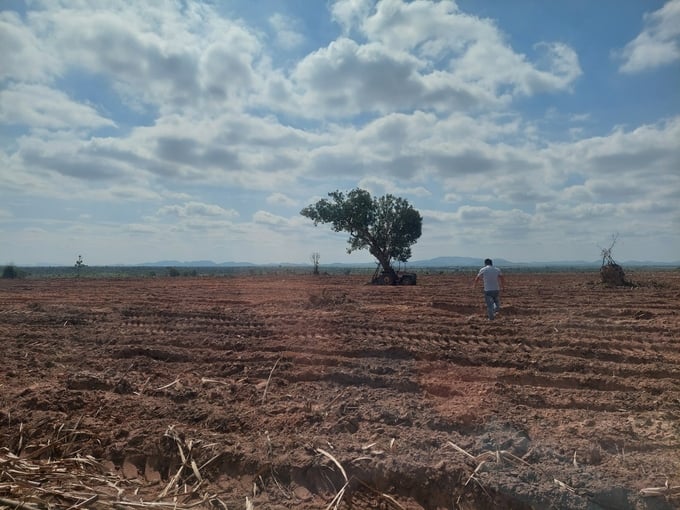
Due to over-cultivation, a large area of land in the Central Highlands has degraded.
Over the years, the Central Highlands has formed large-scale agricultural products, established a brand name and joined the global value chain for products such as coffee, pepper, rubber, etc., This effort has made an important contribution to increasing the country's agricultural export turnover and improving Vietnam's position in the region as well as the world.
Although the agricultural output is large, diverse in types and of high quality, the economic value of the agricultural sector is not commensurate with the potential and advantages of the region. The agricultural development in the Central Highlands still faces many difficulties and challenges in the process of sustainable development in the current context of deep integration.
According to studies under the Central Highlands Program conducted in 2016, the Central Highlands currently has more than one million hectares of heavily degraded land, accounting for 20.5% of the region's natural area. These are areas where land degradation has become so evident that it is difficult to develop agriculture normally.
In recent years, the area of land showing signs of degradation may have risen higher than the aforementioned figure. According to the Central Highlands Agro-Forestry Science and Technology Institute, most of the agricultural production land, especially the long-standing coffee and pepper-growing areas in the Central Highlands, is experiencing considerable physical, chemical and biological changes in a negative direction which adversely affects agricultural production.
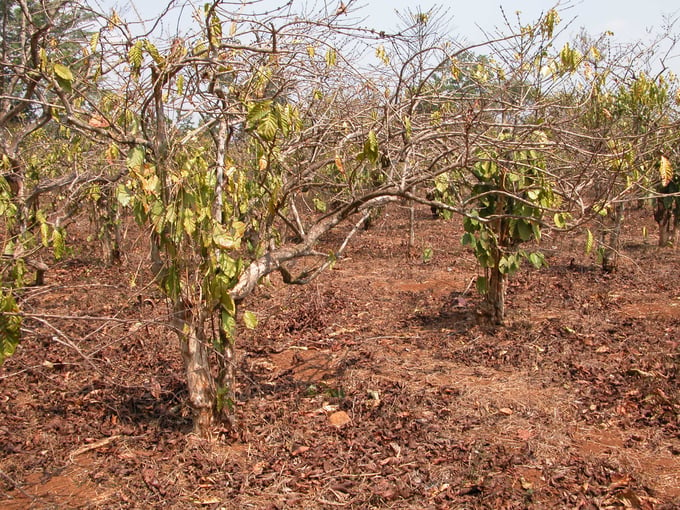
Due to climate change, many coffee production areas in the Central Highlands have been dry in recent years.
Dr. Phan Viet Ha, Deputy Director of the Central Highlands Agro-Forestry Science and Technology Institute, said that the consequences of soil degradation include the reduction of the soil's fertility, which is signalled through indicators such as tight, acidic soil, the ability to retain moisture, poor nutrition retention; low fertilizer use efficiency; soil microorganisms consist mainly of harmful microorganisms; Pests and diseases from the soil grow rapidly and strongly affect the efficiency of agricultural production.
“As for water resources, a survey conducted by Geological Team 704 shows that the potential groundwater level is not as high as in previous years. You can find water in many agricultural areas at a depth of 15 to 20 meters, but now, farmers have to dig up to 25 to 30 meters. For drilled wells, farmers have to drill to a depth of nearly 100m to get water", said Dr. Phan Viet Ha.
Along with the degradation of the soil and water environment, climate change also has a significant impact on agricultural production in the Central Highlands. For the past 10 years, farmers in the Central Highlands have experienced the impact of climate change on the crop production sector. Extreme weather phenomena such as prolonged drought and unusually heavy rain have caused heavy damage to multiple crop areas, including key crops such as pepper, coffee among others.
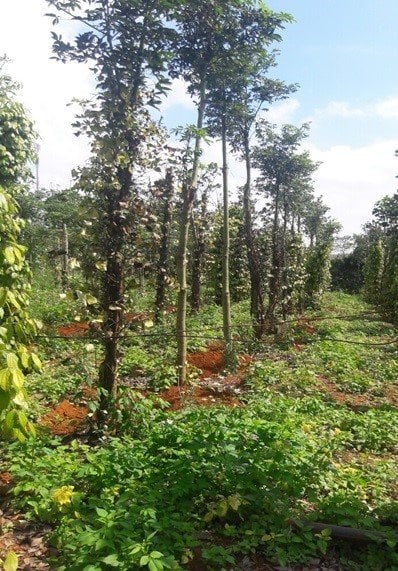
Quick death disease on pepper has broken out on a large scale in recent years, causing heavy losses to farmers.
“The most obvious effect of climate change is the early end of the rainy season, combined with late rains have made coffee trees bloom early and not concentrated, which has affected their yield; The dry season is also prolonged. For example, during the dry season of 2016 to 2017, according to preliminary statistics, coffee production in the Central Highlands did not have enough water to irrigate up to 100 thousand hectares of area. Dak Lak and Gia Lai provinces were the most affected with over 40% of their coffee area damaged by a lack of irrigation water”, said Dr. Phan Viet Ha.
Regarding pepper, although the level of impact is assessed to be less serious compared to that of coffee due to the different cropping characteristics, prolonged drought and the lack of irrigation also affected the yield. In addition, the excessive rain over a short period of time is the main cause for the emergence of dangerous diseases such as quick death and slow death in pepper trees. For coffee and cashew trees, the increase in temperature extremes during the dry season also affects the ability to pollinate, fertilize and set fruit.
Dr. Phan Viet Ha said that climate change not only affects the growth of crops, but also degrades the land and water resources, reduces production efficiency, and negatively affects workers. This causes immediate economic loss, and makes it difficult for farmers to take care of crops.
Climate change in the long run may even disrupt the development characteristics of established crops in the Central Highlands. In reality, the phenomenon of coffee and pepper flowering out of season in some growing areas is increasingly common for the past 3 years; the main reason for which is the increasingly erratic rainy and sunny weather.
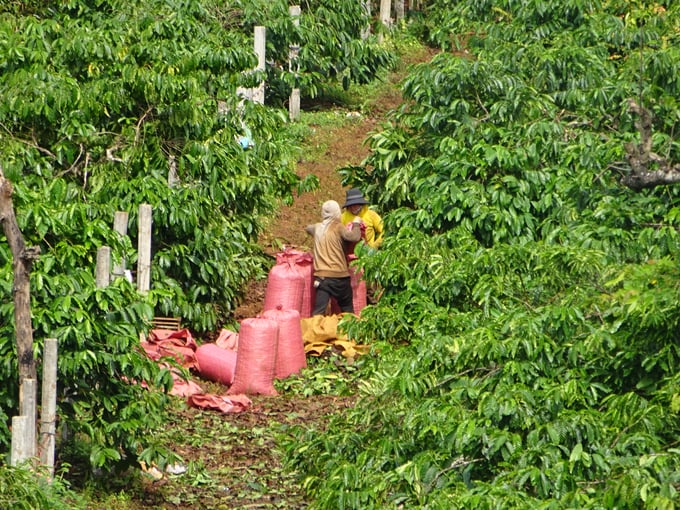
Coffee is the main crop of the Central Highlands.
Dr. Phan Viet Ha said that in recent years, the trend of intercropping industrial crops and perennial fruit trees on coffee farms such as pepper, durian, avocado, cashew, etc. has contributed to diversifying products, creating more jobs, improving and stabilizing incomes for farmers in the Central Highlands. On the other hand, it minimizes the risks of price and market fluctuations, contributing to stabilizing the coffee area. In addition, intercropping also has the effect of shading and blocking the wind for coffee, limiting water evaporation, maintaining the coffee's moisture, and growing sustainably in the context of climate change.
Although technical processes for intercropping have been issued, the specific processes for each crop such as pepper, durian, avocado, cashew, etc. are in their infancy, so certain techniques such as: varieties, planting density, fertilization, watering, shaping for intercropping and coffee trees have not been specifically summarized so that they can be adjusted to suit local conditions.
In addition, farmers tend to prioritize crops with higher economic value, so they often fail to comply with technical recommendations. The time of flowering and fruiting for each intercropped tree is different, making the care process more difficult. If the farmer chooses an intercrop to prioritize investment and care in order to bring higher economic efficiency in the shorter term, it may affect the growth, development and quality of coffee.
Moreover, the intercropping of industrial trees and perennial fruit trees in coffee lacks business cohesion in terms of output for products; this is especially true in remote areas, so the intercropping efficiency is low. The area expansion for intercropping and pure fruit trees should be evaluated with appropriate production areas planned, development of production linkages between farmers and businesses, safe production in association with preliminary processing and processing to meet domestic and export markets.
“The recent increase in material prices has had a great impact on producers. For the past 5 years, the price of agricultural materials in the Central Highlands has increased, increased machine services, harvest, and labor scarcity have resulted in increased investment costs, reduced profits for farmers, and reduced production efficiency. From 2021 to 2022, fertilizer prices have doubled, sometimes tripled compared to the past few years. Therefore, although the current price of coffee has increased to a record high in the past 10 years, coffee farmers are unable to make profit. The rising oil price also greatly affects the care of coffee, increasing the cost of watering, processing and transporting coffee”, said Dr. Phan Viet Ha.
Translated by Nguyen Hai Long

(VAN) Bamboo products from Thang Tho Bamboo Cooperative have reached many countries around the world, while also creating jobs for local workers.

(VAN) The Management Board of Con Dao National Park reported that a green sea turtle, tagged in the Philippines, has traveled thousands of kilometers to lay 84 eggs on Bay Canh Islet.

(VAN) Green technology is paving a new path for sustainable aquaculture in the Mekong Delta in particular and across the country in general, helping reduce emissions and adapt to climate change.

(VAN) On May 27, La French Tech Vietnam (the French startup and innovation community in Vietnam) held the French Tech Summit Vietnam 2025.
/2025/05/27/4731-2-223159_980.jpg)
(VAN) No votive paper, no styrofoam, no plastic bags, no plastic bottles, and no single-use plastic trays are the key rules tourists should keep in mind when visiting Con Dao.

(VAN) In the fight against plastic pollution, Vietnam has been demonstrating a proactive, pioneering, and active role in addressing the greatest environmental challenge today.
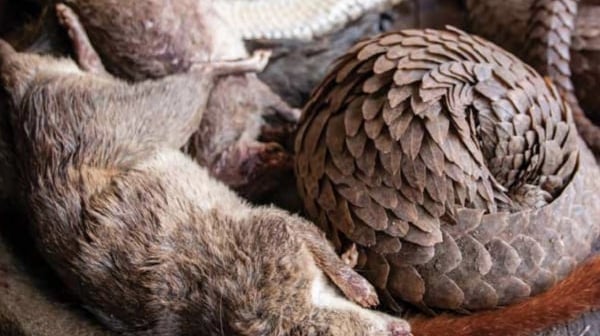
(VAN) The WOAH guidelines provide a vital tool for risk chain analysis, covering the extraction, transportation, consumption, and handling of confiscated wildlife.